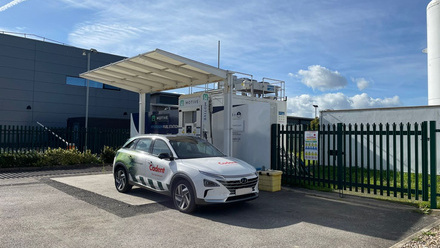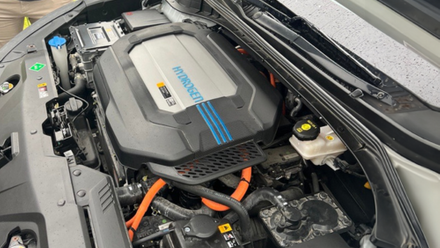Explore the latest advancements in hydrogen-powered vehicles with our hydrogen cars page. Discover how these vehicles are changing the way we drive and leading us towards a more sustainable future.
We discuss the newest technologies and infrastructure advancements in the hydrogen automotive sector. This includes fuel cell electric vehicles (FCEVs) and hydrogen fuelling stations. Learn about the environmental benefits, efficiency, and performance advantages of hydrogen cars.
Whether you're a gas engineer looking to stay updated on industry trends or a car enthusiast eager to explore the potential of hydrogen energy, our goal is to provide you with the most up-to-date and accurate information on the latest developments in the hydrogen automotive industry.
How do hydrogen cars work?
Hydrogen cars are fuelled in two ways, by fuel cells or hydrogen combustion.
In hydrogen fuel cell vehicles (FCVs), hydrogen gas is stored in high-pressure tanks and enters a fuel cell where it reacts with oxygen from the air to generate electricity. This electricity powers the car’s electric motor, and the only byproduct is water vapour.
Hydrogen combustion vehicles, on the other hand, use hydrogen in a conventional internal combustion engine. Instead of burning petrol or diesel, they burn hydrogen, producing water vapour and small amounts of nitrogen oxides as emissions. Although less common than FCVs, hydrogen combustion vehicles offer another route to cleaner transport.
Both technologies aim to reduce greenhouse gas emissions, providing alternative solutions for decarbonising road travel.
Are hydrogen cars the future?
Hydrogen cars have the potential to play a significant role in the future of transport, particularly as the world aims to reduce carbon emissions and shift to cleaner energy. Hydrogen fuel cell vehicles (FCVs) offer several advantages, including zero tailpipe emissions, fast refuelling times, and long driving ranges. This makes them particularly promising for large goods vehicles, heavy transport, and services like ambulances, where long charging times and frequent stops are impractical.
However, the future of hydrogen cars depends on factors such as the expansion of hydrogen refuelling infrastructure, improvements in hydrogen production, and the cost of the technology.
Are hydrogen cars safe?
Hydrogen cars are designed with safety as a top priority, undergoing rigorous testing to meet stringent safety standards.
The hydrogen used in fuel cell vehicles (FCVs) is stored in high-strength, reinforced tanks that are built to withstand extreme conditions, including high pressures and severe impacts. These tanks are thoroughly tested to ensure they are safe even in the event of a crash.
Hydrogen itself is a highly flammable gas, but it disperses quickly into the atmosphere due to its low density, reducing the risk of fire or explosion compared to traditional fuels like petrol or diesel.
Like any new technology, public perception and understanding of hydrogen safety will evolve over time, but with the safeguards in place, hydrogen cars are considered just as safe as conventional vehicles or electric cars.
When will hydrogen cars be available in the UK?
Hydrogen cars are already available in the UK, with some manufacturers, such as Toyota and Hyundai, offering limited models like the Toyota Mirai and Hyundai Nexo. However, these cars are mainly part of trials and are not yet widely adopted. The key challenge is the lack of hydrogen refuelling infrastructure. While there are a few hydrogen refuelling stations in the UK, they are not widespread enough to support mass adoption.
How do hydrogen fuel cell cars work?
Hydrogen fuel cell cars work by converting hydrogen gas into electricity. The hydrogen reacts with oxygen in a fuel cell to generate electricity, which powers the car's electric motor. The only byproduct is water vapour, making them a zero-emission alternative to conventional vehicles.



